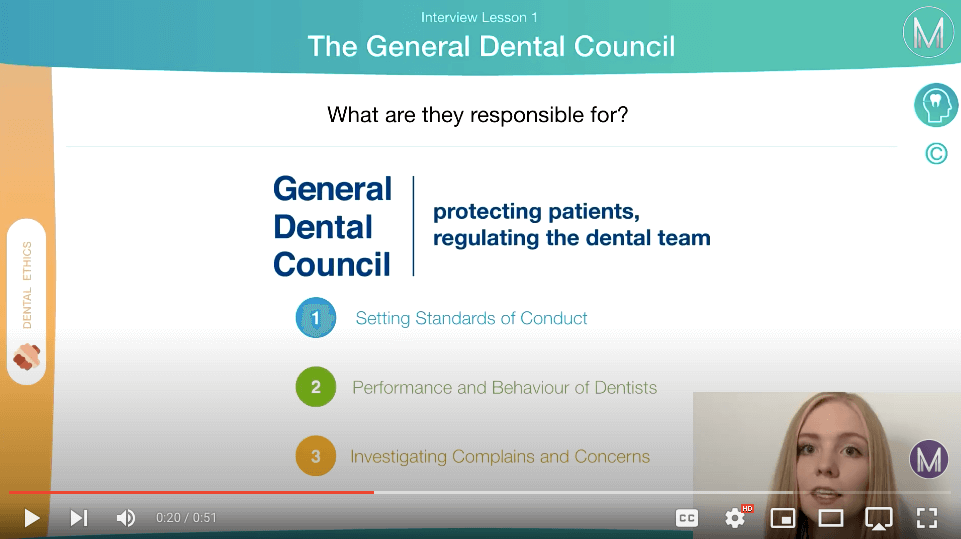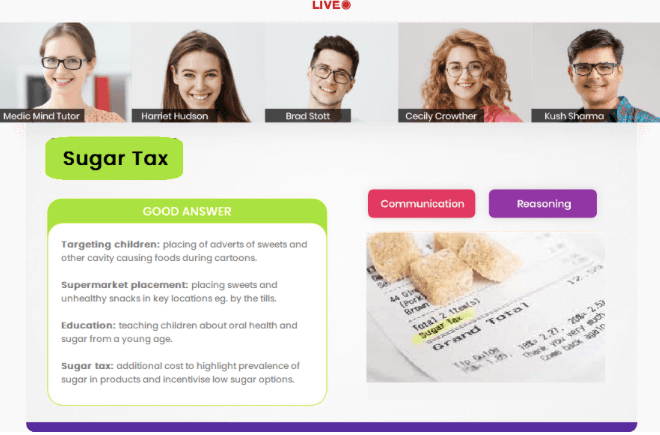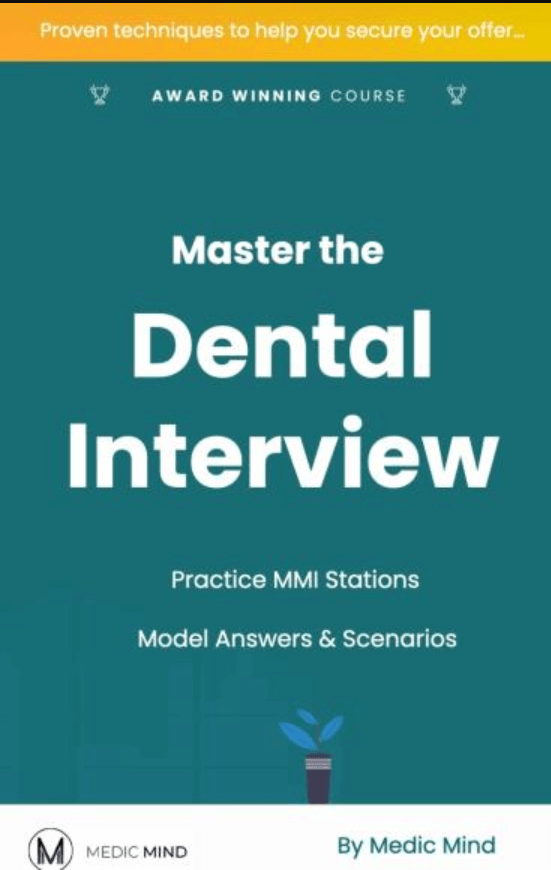Loading...


Top 10 tips for Dental Hygiene and Therapy interviews

The word ‘interviews’ is that one word that can cause worry and dread. But try not to worry, as below there are some top ten tips for perfecting your interview techniques and for showing off the best version of yourself on the day of your interview.

Top Tip One
Every interview will be different, and some universities use different formats. Therefore, look at what format the universities use. The main types of formats include:
- In person interview (popular prior to Covid-19)
This interview format involves a traditional setup of one interviewer and one interviewee (you). Remember that some universities might have more than one interviewer, and some could be current university Dental Hygiene and Therapy students.
- Online (Most common during Covid and after)
This will be conducted remotely using online conferencing software such as Teams or Zoom. During these types of interviews, it is customary to have multiple interviewers who will each ask their own questions.
- Multiple Mini Interview (MMI)
This type of interview involves multiple mini quick interview questions, which get you to demonstrate various skills with different people at each station; this can take place online and can last between 45 minutes to 1 hour and 30 minutes.
This type of interview is broken down into different stations; for example, in one station might be a scenario question. In another station, the interviewees will ask a few questions related to the course, and lastly, another is to show the ability to give and follow instructions, for example folding paper, drawing or sculpting with play-doh. Bear in mind that this may be carried out differently if online.
Top Tip Two
Have a good understanding of the course and its structure, which can be found on the university’s website. Make sure to have a good understanding of:
- GDC Scope of Practice for Dental Hygienists and Therapists, their roles and what they can do. It is essential to know the difference between the two of them.
- The GDC 9 principles and try to memorise them because knowing these will come in handy for some interview questions, as they expect you to relate these to the question, so it shows that you understand the principles.
Top Tip Three
Practice makes perfect. Make sure to practice interview questions; this can be with a family member, friend or even a current student at the university. The best place to look for practice interview questions is Instagram, as many students post about their experiences and share example questions that you can practice with. More so don’t hesitate to ask previous students if they can share any of their interview questions or even how they practised for the interviews.
Kickstart your Dental Hygiene Interview Prep!
Top Tip Four
Look smart and professional and most importantly feel comfortable. It is important to stand out from your competitors. One way of standing out is wearing a colourful and funky top, especially if your interview is online.
Top Tip Five
Relax, smile and just be yourself. It is important that you engage with your interviewers. A bit of small talk will help to calm nerves before the interviewing process begins.
Top Tip Six
When stumped on a question, make sure to pause, take a minute to breathe and consider the answer. One phrase you can use to give you a bit of extra time is, “that is an interesting question. Do you mind if I take a moment to think about that?” Alternatively, you could ask them to clarify the question this will also buy you some valuable seconds to construct your response.
Top Tip Seven
Towards the end of the interview, you may be asked if you have any questions. Some examples could be the course structure, what makes their university better than other universities, the university campus, what they are offering facility-wise, and how practical will the first year of the university be. It would be a great idea to research the technology, teaching styles, course structure and student satisfaction rate at these universities to help with your decision on what university to choose. Asking questions shows initiative, but don’t ask something that you could have easily found out before the interview, as it may sound as if you haven’t researched the course or that particular university, which could portray you in a bad light.
Top Tip Eight
Follow up each interview with a thank you note, this can be via email. Personally, this leaves a great impression after the interview.
Top Tip Nine
Expect the unexpected. Uncommon questions are common in Dental Hygiene and therapy interviews. These questions are designed to reveal how you think under pressure and how you apply yourself to unfamiliar questions. With these types of questions you should try to answer as honestly and open minded as possible. When composing a response, take a deep breath and stay relaxed. Remember the interviewer isn’t trying to trick you, they’re just wanting to see how you respond when you’re put on the spot.
Top Tip Ten
My last top tip is to be confident in yourself and try your best to give a satisfactory answer. Remember, SELL YOURSELF! KEEP EYE CONTACT! and SMILE!
Samples of Interview Questions that you should give a go?
Why do you want to be a Dental Hygiene and Therapist?
What makes a good and bad dental hygienist?
What are the challenging aspects of the job?
If a receptionist was rude to a patient, how would you handle this situation?
What are the legal and ethical aspects of Covid-19?
What qualities do you think a Dental Hygiene and Therapist should have?
What are your strengths and weaknesses?
How do you cope with stress?
Why is empathy important?
What does integrity mean to you?
What interests you about the course?
What do you wish to achieve from this career?
What do you do in your free time?
What is the role of the GDC?
If you were unsuccessful this year, what would you do?
Hot Topics
- Covid-19
- Sustainable dentistry
- Fluoride
- Sugar tax
- Advances in technology
- Mental health in dentistry
- Scope of practice
- GDC
Rejection
The dreaded rejection email. Some universities have a lot of applications, and therefore their interview process can take a long time to get through. So do not panic if they still have not let you know in a month or so after your interview. If you do receive the dreaded rejection email from the university, that is ok.
Respond to the email thanking them for the opportunity, and their time, and ask for some feedback on how to improve for next year’s application. The most important thing is to be positive about the rejection and keep moving forward. It will all work out eventually.


Frequently Asked Question
→What types of questions might be asked during a Dental Hygiene and Therapy interview?
Questions during a Dental Hygiene and Therapy interview may be designed to assess an applicant’s knowledge of the field, clinical experience, problem-solving abilities, and communication skills. Sample questions may include: “What made you interested in pursuing a career in dental hygiene and therapy?” or “How do you handle difficult patients?”
→What are some tips for preparing for a Dental Hygiene and Therapy interview?
Some tips for preparing for a Dental Hygiene and Therapy interview include researching the program, practicing common interview questions, dressing professionally, and arriving early to the interview. It is also important to be knowledgeable about current dental hygiene and therapy trends and to showcase your communication and interpersonal skills during the interview.
→How can I stand out during a Dental Hygiene and Therapy interview?
To stand out during a Dental Hygiene and Therapy interview, you can showcase your passion for the field, demonstrate your knowledge of current trends and issues in dental hygiene and therapy, and provide specific examples of your experiences and achievements. You should also be friendly, engaging, and confident in your communication and interpersonal skills.
→What are some common mistakes to avoid during a Dental Hygiene and Therapy interview?
Common mistakes to avoid during a Dental Hygiene and Therapy interview include arriving late, speaking negatively about previous experiences, appearing disinterested or unprepared, and being overly casual or informal in your demeanor.
→How important is clinical experience for a Dental Hygiene and Therapy interview?
Clinical experience is important for a Dental Hygiene and Therapy interview, as it demonstrates your practical skills and knowledge of the field. It is recommended to gain as much clinical experience as possible through internships, volunteer work, or shadowing experiences.






Was this article helpful?
Still got a question? Leave a comment
Leave a comment